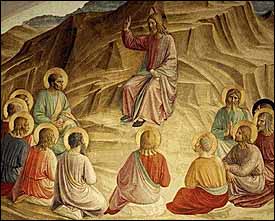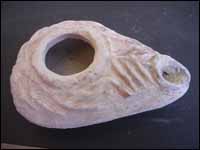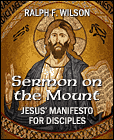
|
Old Testament
New Testament
Gospels
Acts
Paul's Letters
General Letters
Revelation
Topical Studies
Beginning the Journey (for new Christians). en Español

|
Old Testament
New Testament
Gospels
Acts
Paul's Letters
General Letters
Revelation
Topical Studies

|
Home
Bible Studies
Articles
Books
Podcasts
Search
Menu
Donate
About Us
Contact Us
FAQ
Sitemap
2. Witnessing People: Living as Salt and Light in the World (Matthew 5:13-16)
by Dr. Ralph F. WilsonAudio (19:42)
 Fra Angelico, detail from "Sermon on the Mount" (1442), Museo Di San Marco Dell'Angelico, Florence. Full image. |
13 "You are the salt of the earth. But if the salt loses its saltiness, how can it be made salty again? It is no longer good for anything, except to be thrown out and trampled by men.
14 You are the light of the world. A city on a hill cannot be hidden.
15 Neither do people light a lamp and put it under a bowl. Instead they put it on its stand, and it gives light to everyone in the house.
16 In the same way, let your light shine before men, that they may see your good deeds and praise your Father in heaven." (Matthew 5:13-16)
Jesus' teaching on salt and light follows hard on the heels of the Beatitudes, which closes extolling the blessedness of those who are persecuted for Jesus' sake. Together, the Beatitudes and the Parables of Salt and Light form a kind of profile of the Spirit-filled disciple.
Some have been persecuted for silent protest. But many more have been vilified for declaring the Good News by both their deeds and their words. Jesus doesn't restrict our witness to words only or deeds only. Together they comprise the blessing of uncompromising witness.
In verses 13-16 Jesus tells two simple parables and draws conclusions from them. Using parables was a characteristic teaching method for Jesus. He chose two simple concepts -- salt and light -- and expounded from them principles for living.
Salty Christians (5:13a)
"You are the salt of the earth. But if the salt loses its saltiness, how can it be made salty again? It is no longer good for anything, except to be thrown out and trampled by men." (5:13)
"Salty Christians" almost sounds like a serving of "fish and chips." Salty Christians, Jesus tells us emphatically, are much to be preferred over the salt-free variety.
A proper amount of salt (sodium chloride, NaCl) is essential to sustain life, so ancient peoples traded whatever was required to obtain it. In Palestine, most salt came from salt caves in the area around the Dead Sea. Both ancient and modern peoples have used salt as both (1) a food preservative (so Plutarch and Baruch 6:28), and (2) to bring out the flavor of foods (Job 6:6; Colossians 4:6). It was also used to make covenants and mixed with sacrifices.
Salt as a Preservative
So what does it mean to be the salt of the earth? If we use the preservative analogy, we would say that Christians by their very presence help preserve the world and hold back the wrath of God against it. I believe that God's mercy on our sinful world is due to the prayers and presence of the saints on earth. Abraham argued with God over the fate of Sodom and Gomorrah, "Will not the Judge of all the earth do right?" he asked. "Will you sweep away the righteous with the wicked?" And God answered, "For the sake of ten I will not destroy it" (Genesis 18:25, 23, 32).
 "John Wesley" (1703-91), portrait by Nathaniel Hone (1766), oil on canvas, 49-1/2 x 39-1/4", National Portrait Gallery, London. |
But our presence is not only a shield against the wrath of God upon the earth. We also serve as those who by their wholesome presence bring about change and healing in a corrupt society. By the Eighteenth Century, England had sunk to a sad state. Gin flowed freely and drunkenness was common through all classes of society. Gambling was extremely popular, the clergy were corrupt and materialistic, and rationalism and deism held sway among the educated. Historians openly credit the Wesleyan Revival in England with saving society. It was the fearless preaching of John and Charles Wesley and George Whitfield that restored a conscience and brought people to a saving encounter with their God. To be sure, the Wesleys and Whitfield were mocked and vilified by the enemies of God. They were stoned and harassed and run out of town. But by their uncompromising witness, and that of their followers and lay preachers, England was saved and changed.
This awakened conscience was responsible for the final prohibition of the slave trade in England. This was cause championed by William Wilberforce, who had been led to Christ by former slave ship captain John Newton, author of the song "Amazing Grace." Christians are the salt of the earth. Their influence is wholesome and good and healing.
Who led the way toward the abolition of slavery in the United States? Christians. Who led the way toward a non-violent protest against racial discrimination? Christians. Who today stand for the life of the unborn child? Christians. Catholic Christians and Protestant Christians together. Yes, it is an embattled position, but it is right. And Christians can serve as the conscience of the nation today as they have in the past.
While it is true that ancient peoples used salt as a preservative, a search of the Bible for this use of salt comes up empty. The closest we come is a reference in the Apocrypha. The Epistle of Jeremiah speaks of women who preserve some of the meat sacrificed to idols:
"As for the things that are sacrificed unto them, their priests sell and abuse; in like manner their wives lay up part thereof in salt; but unto the poor and impotent they give nothing of it." (part of Baruch 6:28)
The closest we come in the canonical scriptures was the use of salt to render land unusable (Judges 9:45), the rubbing of newborns with salt (to purify them? Ezekiel 16:4), or Elisha's use of salt to sweeten or purify a spring and remove its poison (2 Kings 2:20-21).
Salt as a Seasoning
There is much more evidence in the Bible of salt being used as seasoning, and in the parable we are studying, Jesus seems to be referring more to salt's taste than its effects.
Salt was used with sacrifices as a way of honoring the King to whom the sacrifices were made (Leviticus 2:13; Ezra 6:9; Ezekiel 43:24). Salt was used in the making of covenants (Numbers 18:19). We read of its ability to add flavor to food (Job 6:6), and Paul writes,
"Let your conversation be always full of grace, seasoned with salt, so that you may know how to answer everyone" (Colossians 4:6).
Here, as in Jesus' parable of Christians being the salt of the earth, salt has to do with witness and conversation. In Colossians 4:6 it is used with the Greek word artuō, "to add condiments to something, to season, to salt."1
I believe that the primary meaning of "You are the salt of the earth" has to do with a willingness to live our lives with the "tang" of our faith intact. We're under so much pressure to give up our differences and blend in with society. Believers are to be "tangy" rather than bland and insipid in the way we live and speak.
|
Q1. (Matthew 5:13) In what sense are Christians the "salt of the earth" using the preservation analogy? In what sense are Christians the "salt of the earth" using the seasoning analogy? https://www.joyfulheart.com/forums/index.php?showtopic=735
|
The salt the Israelites obtained was often impure, mixed with alkali salts from around the Dead Sea. Water could leach out the sodium chloride, leaving the other salts intact, so that it looked like salt but tasted insipid. This seems to be the basis of Jesus' warning about salt losing its saltiness. The essential Christ-inspired difference in our lives can be leached out by the constant flow of the world's values through our lives.2
We can come to the point where we have given up our standards and now stand for nothing. We may disguise it by saying that the zeal of youth has been tempered with the wisdom of maturity, but that is only a partial excuse. Someone once phrased the issue this way: If you were being tried for being for being a Christian, would there be enough evidence to convict you?
If we no longer stand boldly and faithfully for Christ and Christian values, we become worthless to him. Less than worthless, in fact, since by our mild claims of our Christianity we act as a counterfeit of the real salt. Worthless, insipid, tangy-less salt is good for nothing except for throwing on the pathway to keep the grass from growing on it. Would you rather be a grass killer or a food enhancer?
|
Q2. (Matthew 5:13) What might be the symptoms of a Christian who has lost his "saltiness"? Is it possible for a believer to detect such symptoms in himself or herself? What do secular people notice about a "de-saltified" Christian? What do other Christians notice about you? Is it possible to "resaltify" your life? https://www.joyfulheart.com/forums/index.php?showtopic=736
|
The light of the world (5:14-16)
 Byzantine period oil lamp, found in tomb in Samaria, village of Fandaqomiya (Pentacomia). Photo: Thameen Darby. |
"You are the light of the world. A city on a hill cannot be hidden. Neither do people light a lamp and put it under a bowl. Instead they put it on its stand, and it gives light to everyone in the house." (5:14-15)
Jesus' second parable about uncompromising witness has to do with light. In Jesus' day, homes were commonly lit by small clay lamps which could be held in the palm of the hand. The most primitive consisted of a saucer to hold the olive oil, in which was immersed one end of a wick that lay in an indentation or spout in the rim. Later clay lamps were sometimes covered, with a hole in the top in which to pour the oil, and a hole at one side for the wick. Don't be confused by the KJV translation of Greek luchnos, "lamp," as "candle." This tends to mislead modern ears, since "candle" suggests to us long wax tapers with a wick protruding from the top. The word is best translated "lamp."
In explaining the concept of making one's witness clear, Jesus introduces a third parable, "A city set on a hill cannot be hidden" (5:14b). Cities were usually situated on hilltops for protection against attack. It is much more difficult to storm a walled city running uphill, and defenders have always known that victory must be claimed by capturing and holding the high ground. Jesus' point, however, is not a city's defense, but its visibility because of its elevated position.
In the same way, he continues, a lampstand would elevate the lamp for greatest illumination within a room. Now he contrasts elevating a lamp on a lampstand to covering a lamp with a bowl. People don't light a lamp to hide its light under a bowl, Jesus says. That's silly! Rather people light a lamp in order to shed light to everyone in the house.
|
Q3. (Matthew 5:14-15) In the parable of "the light of the world," Jesus notes the stupidity of lights being hidden under bowls. Concerning what danger in the life of a Christian disciple does Jesus warn us in this parable? https://www.joyfulheart.com/forums/index.php?showtopic=737
|
Evoking praise towards God (5:16)
"In the same way, let your light shine before men, that they may see your good deeds and praise your Father in heaven." (5:16)
Now Jesus comes to the point: letting people see your good works rather than hiding them. And here is the reason for a Christian's witness: "that [men] may see your good deeds and praise your Father in heaven."
Both salt and light are worthless if they are saltless or hidden from view. Jesus gives these parables right after a discussion of persecution. So we must be willing to bear our witness, even though it may bring persecution. Indeed, Paul says, "Everyone who wants to live a godly life in Christ Jesus will be persecuted" (2 Timothy 3:12). It comes with the territory.
They persecuted our Lord and Master, Jesus Christ. If our lives are becoming more and more like him it shouldn't surprise us if we are persecuted, too. And persecution should bring us joy, says Jesus, "for in the same way they persecuted the prophets who were before you" (Matthew 5:12). Persecution means that people see enough of Jesus in us to be worth resisting and persecuting, so we should count it as a badge of honor, and the portent of a great reward in heaven.
But our purpose in witness is never to stimulate persecution for the sake of reward. That would be essentially selfish. Rather it is to let our light shine so clearly that people can see God clearly in our works and in our deeds, and evoke praise to him.
Words versus deeds
Sometimes people place a false dichotomy between words and deeds. "I testify to my faith in God by the way I live," some say defiantly. "I don't have to say anything."
I agree that we must live lives that bring credit upon Jesus or our words won't be taken seriously. They will be laughed at as hypocrisy and thrown back in our face, and become a cause of greater unbelief on the part of those who watch us.
But deeds without words tell only half the story. Part of seasoning our conversation with salt (Colossians 4:6) is telling the good news to those around us. "The Word became flesh and dwelt among us, full of grace and truth" (John 1:14). Why is Jesus called "The Word"? Because he was the expression of his Father, and spoke the words his Father gave him to speak.
Our witness must consist of both deeds and words that point to God the Father and bring glory to him. What a privilege we have to be the agents of evoking praise to our Father in heaven!
|
Q4. (Matthew 5:13-15) How do verses 13-16 relate to verses 10-12? How does hiding our light affect the glory of God? Why must glory and suffering go hand in hand? Was Jesus' suffering necessary? Is ours? What does this have to do with Romans 12:2? https://www.joyfulheart.com/forums/index.php?showtopic=738
|
A light to the nations
Through the prophet Isaiah, God begins to delineate the role and ministry of his people and servant Israel, and their embodiment in his Servant the Messiah.
"It is too small a thing for you to be my servant
to restore the tribes of Jacob
and bring back those of Israel I have kept.
I will also make you a light for the Gentiles,
that you may bring my salvation to the ends of the earth" (Isaiah 49:6)
"Listen to me, my people;
hear me, my nation:
The law will go out from me;
my justice will become a light to the nations" (Isaiah 51:4)
"Arise, shine, for your light has come,
and the glory of the Lord rises upon you.
See, darkness covers the earth
and thick darkness is over the peoples,
but the Lord rises upon you
and his glory appear s over you.
Nations will come to your light,
and kings to the brightness of your dawn" (Isaiah 60:1-3).
 Sermon on the Mount: The Jesus Manifesto is available in paperback and ebook formats |
Where once this commission was given to the nation of Israel, it is now passed on to the citizens of the Kingdom of God as our commission, too (Acts 1:8). As Jesus once said, "I AM the light of the world" (John 9:5), now he says to all of us, "You are the light of the world ... Arise, shine, for your light has come, and the glory of the Lord rises upon you" (Matthew 5:14 with Isaiah 60:1). We are to be salt for the world and light for the world -- to the glory of God!
Prayer
Father, you are indeed worthy and deserving of a people who are fully committed to you and unafraid to say so. Forgive us for sometimes hiding our commitment to you in order to avoid unpleasantness from unbelievers. Help us to be unashamedly salt and light in your world, until you return with the full uncompromising brilliance of your Coming. In Jesus' name, we pray. Amen.
References
- Artuō, BDAG 137.
- Friedrich Hauck, halas, in TDNT 1:228-229; William Barclay, The Gospel of Matthew, volume 1, p. 115.
Copyright © 2026, Ralph F. Wilson. <pastor![]() joyfulheart.com> All rights reserved. A single copy of this article is free. Do not put this on a website. See legal, copyright, and reprint information.
joyfulheart.com> All rights reserved. A single copy of this article is free. Do not put this on a website. See legal, copyright, and reprint information.


 To be notified about future articles, stories, and Bible studies, why don't you subscribe to our free newsletter, The Joyful Heart, by placing your e-mail address in the box below. We respect your
To be notified about future articles, stories, and Bible studies, why don't you subscribe to our free newsletter, The Joyful Heart, by placing your e-mail address in the box below. We respect your